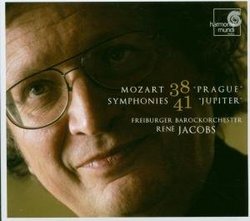A Prague unlike any other
DAVIDNYC1023 | New York, NY | 05/01/2007
(5 out of 5 stars)
"The first movement of the Prague is 150% perfect, the second movement is 200% perfect, the third movement is 250% perfect. It just gets better and better. More and more exciting. This performance is unbelievably good, amazing, spectacular. I'll continue listening to this recording back-to-back day-after-day for awhile.
Now, for the Jupiter, it's less clean and less colorful and less imaginative than the Prague -- at least to my ears. It's a very lively and lovely performance/recording, definitely, absolutely. But it's lacking something, I find. It's very exciting, for sure.
i worship Rene Jacobs (as a conductor)... i love marc minkowski's recent mozart symphonies disc, which has my favorite gminor symphony (#40), but i found his jupiter missing a little something as well (though i like it more than jacobs)... this disc, Rene Jacobs, definitely has my favorite Prague.
my favorite Jupiter, hmm, probably Giulini/Berlin on DG -- a VERY hard to find disc."
A Jupiter unlike any other
Laurance Maney | Vermont, USA | 04/11/2007
(5 out of 5 stars)
"The idiosyncratic style of Jacobs' Mozart opera series carries over into the Prague symphony with great effect, giving a wholly operatic reading of this great symphony that is in a league of its own. With the Jupiter, however, Jacobs takes us into the world of Schubert, specifically the 3rd and 6th symphonies. This is a Mozart less promethean than one who can dance and set us to dancing with him. An absolutely incredible reading that should be heard by any lover of Mozart, whether that love be with the Mozart of Bohm, Klemperer, Walter, Kertesz or the Mozart of Jane Glover, Hogwood, or Jap ter Linden. An absolute must."
Mozart Was NOT Baby Beethoven...
Giordano Bruno | Wherever I am, I am. | 01/21/2008
(5 out of 5 stars)
"...though apparently conductors of the 20th Century considered him such, judging by the many "Promethean" performances of his later symphonies. (Honestly, I question whether Beethoven himself was Beethoven enough for the likes of von Karajan and others.) Rene Jacobs has boldly discarded that Mozartean warhorse tradition and chosen to give us a Mozart of the Enlightenment, an operatic and capricious Mozart. The issue, for me, is not the vexed question of "authenticity". The Freiburger Barockorchester does perform on period instruments, and that does make a difference, especially in the timbre and expressiveness of the reeds and horns, as I'll discuss later. Rather, the main issue is one of sensibilities, as manifested in performance practices.
The first fundamental is the scale of the performance, the size of the ensemble. At 35 musicians, the FBO is half the force of many 20th C orchestras. A huge orchestra might have the advantage performing in the Gare du Nord, but for a recording session, size is far less important than clarity. Instead of fuzzy en masse tuning, one hears the chords as such, in the case of the Prague outer movements it seems almost for the first time. Likewise, the flutes sound like flutes, the contrabasses like contrabasses, and especially the bassoons like bassoons. Stated simply: the recording technology of this CD is a triumph; the realism of the instruments is unexcelled. Even the kettle drums, which are prominent in both symphonies, have dramatic precision and clarity of tone.
Having mentioned bassoons, I wonder if listeners to performances such as Klemperer's or Boehm's were aware of the brilliant passages given to the bassoons, especially in the "Prague" symphony. Often the inner voices were covered in the old-fashioned rumbling versions of Mozart. The baroque bassoon was a softer but much more expressive instrument than our modern one, and I was thrilled to be able to hear the bassoon passages that I know are in the score. Transparency and attention to the inner voices are among the main tenets of "historically informed" early music performance practice, and here they pay off. This Mozart is more complex in texture, more heterophonic, than any you've heard before.
Another hallmark of modern historically-informed performance practice is extension of phrases, attention to the horizontal structures of music in real time. The habit of listening to polyphony still prevailed in the 18th C and it makes a huge impact in listening to "late early" music like Mozart's. The Andante of the Prague symphony, as conducted by Jacobs, depends on continuity of phrases that flow from one instrument to another bar after bar. If articulations and dynamics are not well matched, the voices sound like slices of meatloaf slathered with chordal gravy. This Andante, as another reviewer declares, can seem soporific if the detail is not elegantly expressive. On this CD, it's the jewel, the best of the best.
Mozart wrote his last symphonies at a time in his career when his musical mind was given chiefly to the great operas. Jacobs has chosen to treat these two symphonies operatically, with maximum contrast, maximum suddenness, maximum sprezzatura. In #41, I can almost imagine what phrases would be accompanied recitativo and what would be aria. Listeners very familiar with old-style performances are likely to be unsettled at first by Jacobs's manneristic interpretation of #41. It will help if you clean the anachronistic "Jupiter" images from your ears. On the whole, I like Jacob's #38 better than #41, but then I think #38 is a more cohesive, incisive composition to begin with.
What makes this CD so superb? Freshness! Revelation of detail! Acoustic realism! Intimacy! I've deliberately listened to all the CDs and LPs of these two symphonies available to me just now - Casals, Klemperer, Krips, Ter Linden, Boehm, and Mackerras - in response to a one-star review here on amazon that I consider wrong-headed. Only the Mackerras comes close to the Jacobs, and that not very close. This may well be the Mozart CD on which to base a new performing tradition."


 Track Listings (7) - Disc #1
Track Listings (7) - Disc #1